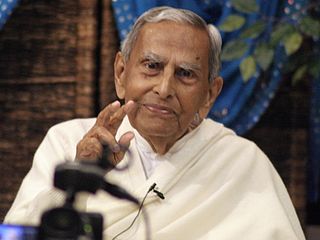A Quote by Steven Pinker
There's a common criticism of evolutionary psychology that it's fatalistic and it dooms us to eternal strife, 'Why even try to work toward peace if we're just bloody killer apes and violence is in our genes?'
Related Quotes
People are always invoking evolutionary psychology for everything. "Why do men hang around asking women out? Oh, to improve their reproductive success," every damn thing - religion, art - it can all be explained by evolutionary psychology. But in our hearts we know that evolutionary psychology is only sort of accurate, because it really doesn't capture what's most interesting about our lives.
Considering that we live in an era of evolutionary everything---evolutionary biology, evolutionary medicine, evolutionary ecology, evolutionary psychology, evolutionary economics, evolutionary computing---it was surprising how rarely people thought in evolutionary terms. It was a human blind spot. We look at the world around us as a snapshot when it was really a movie, constantly changing.
There is a whole field of inquiry that has come up in the last 30 or 40 years - some call it sociobiology or evolutionary psychology - relating to where we get our moral sense and why we value the idea of altruism, and locating both answers in behavioral adaptations for the preservation of our genes.
By failing to read or listen to poets, society dooms itself to inferior modes of articulation, those of the politician, the salesman, or the charlatan. In other words, it forfeits its own evolutionary potential. For what distinguishes us from the rest of the animal kingdom is precisely the gift of speech. Poetry is not a form of entertainment and in a certain sense not even a form of art, but it is our anthropological, genetic goal. Our evolutionary, linguistic beacon.
I've often said why does God leave us here on earth, once we accept Christ, once we're in the family, why didn't he just kill us. Why leave us here? Well, because he's working on our character through these trials, these tribulations, we're learning to practice what we're going to do in heaven. So really, the kingdom mindset is actually the eternal mindset. It's not just about eternal life. Eternal life is getting ready for that.
The rush and pressure of modern life are a form, perhaps the most common form, of contemporary violence. To allow oneself to be carried away by a multitude of conflicting concerns, to surrender to too many demands, to commit oneself to too many projects, to want to help everyone in everything, is to succumb to violence. The frenzy of our activity neutralizes our work for peace. It destroys our own inner capacity for peace. It destroys the fruitfulness of our own work, because it kills the root of inner wisdom which makes work fruitful.
We admit that we are like apes, but we seldom realise that we are apes. Our common ancestor with the chimpanzees and gorillas is much more recent than their common ancestor with the Asian apes - the gibbons and orangutans. There is no natural category that includes chimpanzees, gorillas and orangutans but excludes humans.
The law of karma is neither fatalistic nor punitive; nor is man a hapless, helpless victim in its bonds. God has blessed each one of us with reason, intellect and discrimination, as well as the sovereign free will. Even when our past karma inclines us toward evil, we can consciously tune our inclination towards detachment and ego-free action, thus lightening the karmic load.
The basic cause of all our difficulties is immaturity. That's why I talk so much about peace within ourselves as a step toward peace in our world. If we were mature, war would not be possible and peace would be assured. In our immaturity we do not know the laws of the universe, and we think evil can be overcome by more evil. One symptom of our immaturity is greed, making it difficult for us to learn the simple lesson of sharing.
I assured the prime minister, my administration will work hard to lay the foundation of peace in the Middle - to work with our nations in the Middle East, give peace a chance. Secondly, I told him that our nation will not try to force peace, that we'll facilitate peace and that we will work with those responsible for a peace.
We are now returning to the 18th century empirical approach with the new interest in the evolutionary basis of ethics, with 'experimental' moral philosophy and moral psychology. As a result, we understand better why moral formulas are experienced as ineluctable commands, even if there is no commander and even if the notion of an inescapable obligation is just superstition. So moral philosophy has made huge progress.



































